Rajesh Khanna : Echoes Of An Era- Agony And Ecstacy
Subscribe to read full article
This section is for paid subscribers only. Our subscription is only $37/- for one full year.
You get unlimited access to all paid section and features on the website with this subscription.
Not ready for a full subscription?
You can access this article for $2, and have it saved to your account for one year.
On the first day of shooting, I reported three hours late. By the time I reached the studio, it was 11 a.m. Everyone was waiting and everyone was visibly angry. Nobody expected this from a newcomer. Somebody even taunted, "if this is the way he is going to behave, he ought to pack up before he begins." I should have felt frightened by their reactions. Instead, I got defensive. In my usual, arrogant tone , I said, "in which case, to hell with the career and to hell with this film. My life-style cannot change for my career " I am sure the unit found me swollen headed. And they were not completely unjustified to think so. What they didn't understand and what nobody understands even today is that I don't arrive late for shootings on purpose. It isn't as if I am sitting at home, enjoying troubling the producer or maybe they thought that I was probably drinking till late night and so found it difficult to wake up. It was not so. What can I do if I cannot mentally tune my body to get ready early? I was slow. I still am. I like to settle down slowly I take this time to prepare the actor within me. A good actor ought to do his homework at home and not on the sets. I came on the sets with my homework done. But that is not how it was taken. My late arrival was made into an ego problem, when it wasn't. I am wise enough not to let my ego spoil my performance. Besides, I never forget a golden line my father often repeated and which has over the years become my favourite line as well --"the more fruits, a tree bears, the more it bends. The greater the man, the more humble he should remain."
Consciously, I have never been rude or uncooperative with anyone. Unconsciously, I am sure it has happened several times. I am human, after all. So what if I am Rajesh Khanna? In fact, I soon realised that being Rajesh Khanna had more deprivations than advantages. Now I could never stand on the road and enjoy my pani puri or chaat like old times. Times change and even though inside you, you are the same person, outside, a lot of things transform...
For someone who was used to being referred to as 'Koko' at home, I was learning to adjust to the sound of a new name. Rajesh Khanna. Jeetendra, my original name wasn't good enough, for there was already one actor by the above name and there were bound to be confusions. Jatin on the other hand was too short and too familiar "It isn't impressive," said my uncle, so we dropped that name too. It was mamaji's idea to call me Rajesh. "Rajesh Khanna sounds nice," the uncle said. "Rajesh means king of the kings. May God give you such prosperity too."
.jpg/Pics%201%20(1)__600x450.jpg)
I don't know how prosperous I am but I was quite certainly amongst the most privileged of all actors then. If I could report and get away coming so late for my shooting, I had to be very special star.
During the outdoor shooting of Raaz (1967) at Kulu, one evening, after pack up, I invited a few technicians to my room for a drink. It was biting cold and just as we were getting ready to raise a toast, in walked the production-controller of the unit. He yelled at everyone for sitting down to drink. "Don't you know we have an early morning shoot?" Then looking at me, he said, "Aur aap... yeh sab nawabi thaat pehli film mein shobha nahin dete! You have come here to shoot, not to have fun."
I was mad. I couldn't get over the way he had yelled at everyone. I said, "Look, this is not your set. This is my room. What I do after pack up, is not your problem, but mine." He wasn't prepared for this. In frustration, he picked up a plate from the table and threw it on the floor. I was equally mad. I said, "you break a plate and I'll break the table." The argument continued. Ultimately, I said, "if this is how you will behave, I walk out of the film, this minute. All the expenses incurred due to my involvement, I'll reimburse it on reaching Bombay " "We'll see tomorrow," he said in a mysterious tone.
In the morning however, the production guy had changed his mind. He apologised for his behaviour and as far as I was concerned, all was forgiven and forgotten. It was only on reaching Bombay, did I realise that his friendship was a mere facade. Not wanting to inconvenience the shooting, he had at that moment decided to toe the line. That was my first taste of film politics. National politics, of course, came much later.
On reaching Bombay, this man complained about me to Sippy saab. I was summoned to his office where I was grilled and rebuked. Now, I had no option but to give my version of the story The good thing about the incident was that the misunderstanding brought me closer to Sippy saab. Both, personally and professionally And in the coming years, we did many more films together.
After Raaz, which didn't do well at the box-office, producers were slow in coming with offers.
Producer-director, Chetan Anand contacted me for Aakhri Khat (1966). It wasn't a mainstream subject but I was drawn to my role. A small budget film, Aakhri Khat offered me no monetary gains, but as an actor, the role was satisfying. More than anything, the film introduced me to a new cinema. A fascination, that continued all through my career I did films like Baharon Ke Sapne (1967), Khamoshi (1970), Aavishkar (1973) at a time I was doing relatively well for myself. In fact, Khamoshi came to me because, apparently Waheeda Rehman herself, recommended me for this role.So did Sharmila Tagore. She had seen a photograph of mine and mentioned me to Shakti Samanta. They were planning Aradhana (1969) and were on the look out for a face that could click both, as the father as well as the son. Aradhana was meant to be Sharmila Tagore's film. It's destiny however that it became my launching pad. Nobody knows this but the film went through deep trouble before it could make it to the theatres. The distributors didn't think the project was a hot cake because one, it had a newcomer in the lead, (that too in a double role) and two, more important, sex-kitten Sharmila Tagore was deglamourised as she played a widow after the interval. They predicted doom! "The film will not be accepted," everyone said. They were wrong. Aradhana created history! For months after its release, there were serpentine queues outside all theatres.

I was happy. The adulation I received lifted my confidence. And as days went by, I got used to raining hits -- Bandhan (1969), Do Raaste (1969) came around the same time. Both these films had Mumtaz. Like Sharmila Tagore, Mumtaz and I were turning into a popular pair. Do Raaste had Anju Mahendroo, my first heroine, too. The two of us had a fight over something as a result of which, both of us behaved extremely unprofessionally while shooting together Everytime I said my lines, she looked in the opposite direction and every time she said her dialogues, I looked away. This continued throughout the schedule and the hassled producer was utterly confused as to what was happening and why. Nor did we, frankly. For, if we did, we wouldn't have behaved in so juvenile a fashion. I know it all sounds foolish but one cannot disassociate an incident from one's life, just because it was foolish or childish...
B.R. Chopra was one of the producers belonging to the United Producers Association with whom I was under a contract to do a film at a salary of Rs.2000 a month. Chopra wanted me to do a film with him at a time I was riding the crest of success. Legally, I could not refuse him since I was bound by my contract but ethically, I had different views on this topic. Anyway since the film had to be completed in a month's time we wanted a simple, uncomplicated subject.
Ittefaq (1969) was a murder mystery. Tautly written and tautly directed, the film was gripping until the last frame. No actor, no matter how brilliant can work miracles by himself. The script, the direction has its contributions. I worked very hard on my roles. I'd carefully work out character traits, mannerisms, etc. There were times, I'd wake up my director in the middle of the night because there was something disturbing about the scene. Yet, the press ironically always attributed my success only to my good luck. Journalists never ever said that I was successful because I was talented, or because I worked hard.
One film I worked very hard over and which didn't do well was Maalik (1972). Even today, I maintain that it was an unusual film, in the sense that the conflict between science and religion is contemporary and relevant. The film proclaims a theory. The hero believes in God, the heroine, in science. I feel that the film failed because people don't believe in God any longer. Even a hit pair (Sharmila and I) could not save this film!
.jpg/Pics%201%20(8)__371x480.jpg)
All of us knew that Safar (1970) would do well. Partly because of the cancer struck hero and partly because of the unusual casting. Feroz Khan, Sharmila and I were coming together in a film for the first time. Even Ashok Kumar and Nadiraji had important roles. The director, Asit Sen was so sensitive to the film. What I had not anticipated was the backlash from my fans. Angry letters warning me, not to die in future films, poured in every day. Their strong reactions filled me with self-doubt. I realised then that I had a responsibility towards my audience. The more letters I received, the more confused I became. It's strange, but the true struggle of an actor begins only after success. Because now the expectations became too many. Also suddenly too many enemies sprang up on the scene. They say success brings its own set of problems. I was facing my set of problems too. And yet I was enjoying my stardom. My fame.
In the meanwhile, contradictions continued. I hated being mobbed. And I loved the adulation. I hated the internal politics and I loved the glamour I kept my head on my shoulder, at least, I tried... For I knew, that the people I meet while climbing up today would be the same people I'd meet while coming down one day.
Haathi Mere Saathi (1971) came to me because other heroes didn't want to share the credit with elephants.
Also because working with animals isn't always comfortable. The film not only proved to be a smashing hit but it was a trendsetter of sorts. An unforgettable incident happened during the making of HMS. As I entered the set one day, I saw Chinappa Devar hitting a small boy with a stick. When I asked Devarsaab, why he was doing this, Devarsaab said, "this boy is paying for your crime, Sir. You report late for work every day. I cannot tell you anything because you are a superstar. But I have to give vent to my anger. After this, on Devarsaab's set at least, I never reported late for shooting.
The more successful I became, the more relatives appeared on the scene. Their reactions were predictable. While some were eager beavers, others were downright disapproving. "Do boys from good families pursue a career in films?" asked some. "He is my son and if as his father, I have no objection, I don't see why must you, either?" was my father's answer to them. My mother was more concerned about my personal life. "Don't you love any woman who you would like to marry and bring home?" she'd ask me. All she wanted from me was a bride. "The house is lonely after you go for work." Except for this one, my mother made no demands on me. "Your choice is mine," she said. "You have to live with her. So bring someone you can be happy with... Bring me a daughter-in-law and I'll make her my daughter "
My marriage was an obsession with her from the beginning. Ever since I was a child, she had been planning my baraat. When I was very young, we had gone to attend a wedding in Delhi. There, in fun, someone put me on the dulheki ghodi. Few others, mistaking me for the groom (I had a paghdi on my head) garlanded me and some more presented me with cash. A passerby, assuming me to be the asli groom said to his wife, "aaj ke zamane mein bhi log bachchon ki shadi karte hain." Rather than feel offended by such a comment, my mother was thrilled to bits and repeated the above incident to everyone at home.
Mother saw all my films except Anand (1970). I had made her promise me that she would never see this film. And there was a reason for this. Earlier, after a trial show of Safar, mother was taken seriously ill and had to be hospitalised the same day After this, I did not permit her to see any film in which I suffered or died. Even though mother understood that films were a make-believe world, she got affected by my fight scenes. Strangely, she never did mind my love scenes, not even the so-called hot romancing. Curious, I once asked her how come she didn't mind me romancing with my heroines. She said, "pyaar hi to karta hai, chori nahin." Her only concern was that I should not suffer. Watching me run on the streets in Ittefaq, she said, "you have to go through so much trouble, chot to nahin aati kahin?'
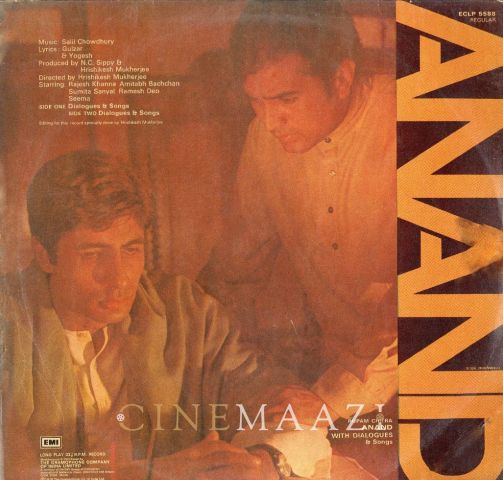
What hurt her most, and what she couldn't come to terms with were the constant nasty rumours about my accident and ill-health. Everyday, newspapers and magazines were forever killing me or injuring me in accidents those days. And everytime, she went through tremendous pain each time similar news items appeared in print. "Mere bete ko duniya ki nazar lag gayi," she told my father Eventually to pacify her, my father organised a big havan at home.
Anand got me an adulation I wasn't prepared for. Nobody knows this but Anand was shot during the busiest phase of my career I was turning hysterical with work pressure. I went sore throat telling everyone that I could not sign more new films, but nobody cared and nobody listened. Now I had films by kilos and no dates!! I was being criticised for being overworked, for being disorganised, for being greedy I wasn't any of these. My problem was, I didn't know to say 'no'.
During this phase, once, I reported later than usual on Hrishikesh Mukherjee's sets. Hrishida wasn't used to such carelessness. They had been waiting to shoot a very important scene. I had very long dialogues to memorise and felt tortured. I kept addressing the heroine by the wrong name. Frustrated, Hrishida got up from his chair, "my heroine's name is not Madhu. It's Renu. Why are you calling her Madhu? Who is Madhu?" "Madhu is my heroine of Aan Milo Sajna (1970)," I apologised to the director. Gurnam, my secretary and friend present in the room said, "Of Kati Patang (1971) Kaka, not Aan Milo Sajna."
I don't know how Gurnam coped with me. He worked for me 22 hours a day. We fought like cats and dogs. But at the same time, we couldn't do without each other for a minute. We were similar people. We had known each other ever since our theatre days, so we had, kind of, got used to each other.
Even though I became very successful in films, my association with theatre friends did not break. Once, every month, my theatre friends came home for a long evening. Over drinks and cigarettes, we discussed plays and performances. We talked about our good old days. Those days, even after putting in so much hard work, we were unable to get a full house at our performances. To ensure a houseful, we friends had worked out a trick. We'd go to Churchgate station, catch hold of strangers and say, "arre Chunilal, Murarilal ne ye ticket bheji hain. Bola hai theatre dekhne zaroor aana" and stuffing a dozen tickets in his hand, run out of sight. The trick invariably worked and we managed to get a houseful, even if in the bargain we spent money from our own pockets. Still, the effort was worth it and that's what mattered. I think every phase one goes through has both good and bad memories. Those days we ate panipuri at Chowpatty and dreamt of five-star food. Today, one has five-star culture all around and one craves for chaatpani of Chowpatty.
One day, driving home from a party at the Taj Mahal Hotel, I stopped on the road to eat pani purl. I covered myself with a muffler and since it was very late in the night, I didn't expect to be recognised. A group of kids spotted me and it created a riot! My driver had to smuggle me inside the car and take me home. I dreamt of my incomplete panipuri plate that night. But I dared not even tell anyone for after the chaos nobody let me go anywhere near Chowpatty.
The more hits I gave, the more, restless I felt. One day Hrishikesh Mukherjee caught me in a reflective mood on his sets. "When was it last that you saw the sunrise, Kaka?" he asked me. "I don't remember," I said. "And when was it last that you saw the sunset? "I smiled. I didn't have to answer He knew my answer.
This article was originally published in a Junior G's supplementary issue -Rajesh Khanna: Echoes Of An Era- issue. The images used in the feature are taken from Cinemaazi archive and the original article.



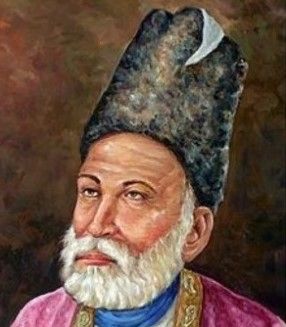
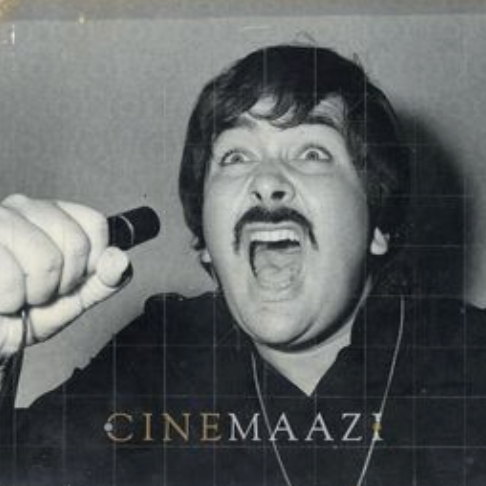
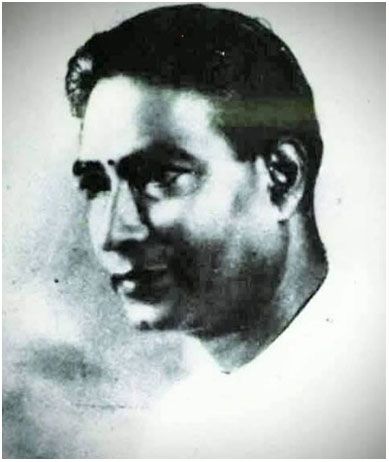
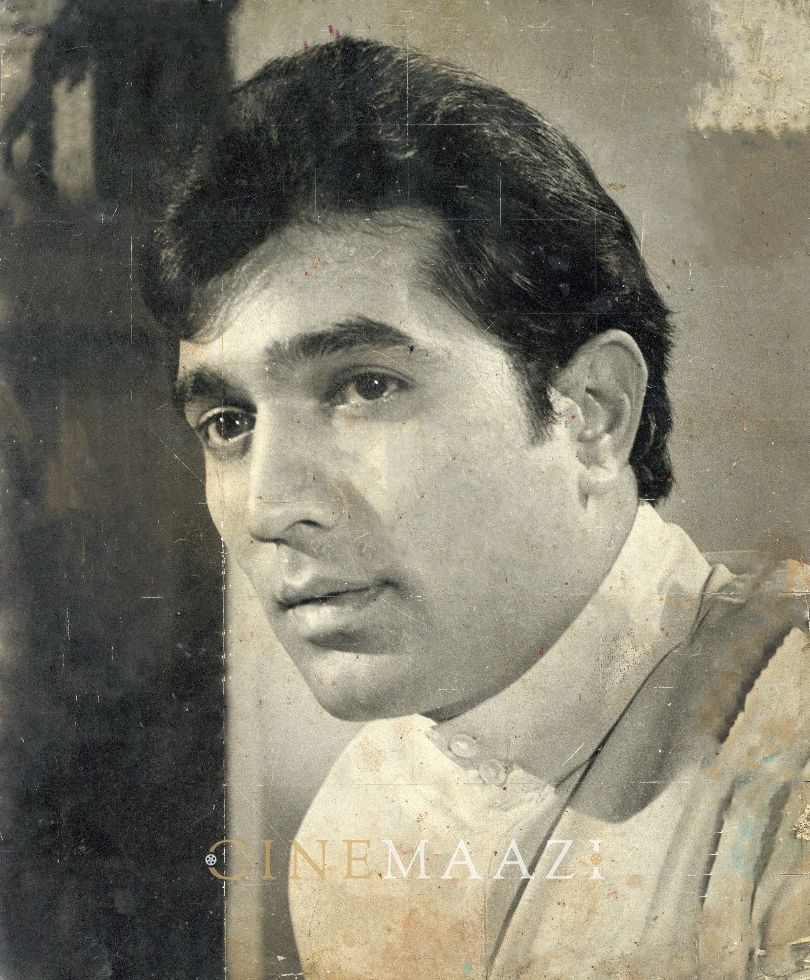
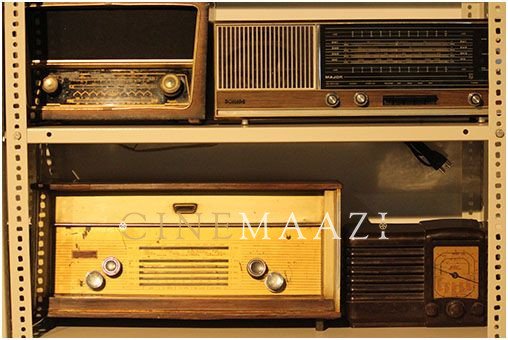
.jpg)



